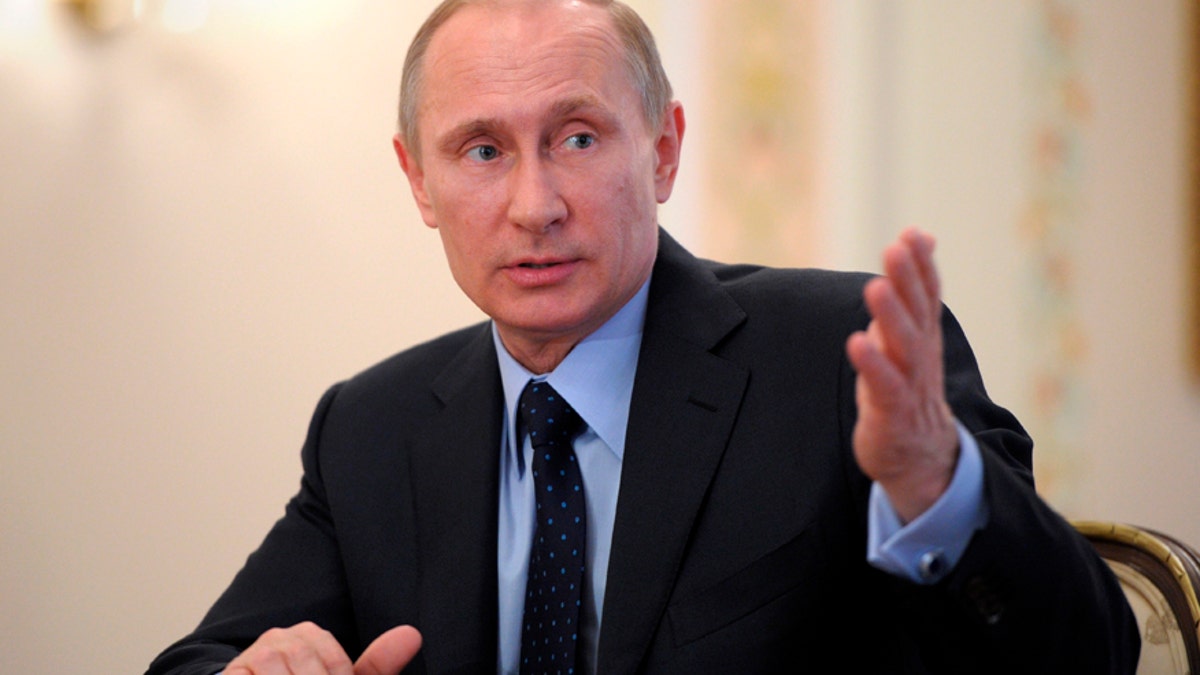
Russian President Vladimir Putin. (AP)
MOSCOW – Russia's President Vladimir Putin threatened Wednesday to start charging Ukraine in advance for vital gas supplies -- a move that could sharply hurt his neighbor, which is already on the verge of bankruptcy.
It was just the latest way Moscow is tightening the economic screws on Ukraine since its pro-Russian president Viktor Yanukovych was ousted from power in February after months of street protests.
Chairing a meeting with government ministers in his suburban residence outside Moscow, Putin said asking for advance gas payments "corresponded with the contract" between Ukraine and Russia. Still, he suggested that the state energy giant Gazprom to refrain from such drastic measures until "additional consultations" between both sides.
Russia has already eliminated a gas discount it had given Ukraine, arguing that it was tied to a lease for Russia's Black Sea Fleet base in Crimea, a Ukrainian region that Russia annexed last month. And Ukraine has promised the International Monetary Fund that it will cut energy subsidies to residents in exchange for a bailout loan of up to $14 billion -- so gas prices were set to rise 50 percent on May 1 even before the latest salvo from Putin.
Speaking in Kiev earlier, Ukrainian Energy Minister Yuri Prodan said Ukraine will pay for March deliveries of gas from Russia only after it reaches an agreement on the price. He rejected the new, much higher price that Gazprom announced earlier and said Ukraine has not pumped in any gas from Russia so far this month.
Authorities in Kiev also warned Wednesday they are prepared to use force to clear several government buildings seized by pro-Russian separatists in the east of the country.
Interior Minister Arsen Avakov said the standoff in Luhansk and the two neighboring Russian-leaning regions of Donetsk and Kharkiv must be resolved within the next two days.
"I want to repeat that there are two options: political settlement through negotiations and the use of force," Avakov told reporters. "We are ready for both options."
As he spoke, anti-government protesters in Luhansk erected high barricades along a thoroughfare running in front of the security service premises.
All the cities affected by the uprisings are in Ukraine's industrial Russian-speaking heartland in the east, which has a large population of ethnic Russians and where economic and cultural ties to Russia are strong. Many residents are suspicious of government that took power in February.
In a sign of the public relations battle going on between the two nations, some Russian media -- including state-run RIA Novosti -- switched their description of those occupying the buildings from pro-Russian protesters to "supporters of federalization."
Protesters continued to occupy the headquarters of Ukraine's Security Service in the eastern city of Luhansk, with hundreds of supporters camped outside and shouting "Putin! Putin!" overnight.
The security agency had said the separatists inside the building, armed with explosives and other weapons, were threatening hostages inside. The hostages -- 56 in all --were allowed to leave the building overnight, it said. Local police disputed that claim, however, saying there had been no hostages.
Serhiy Tyhipko, a Ukrainian lawmaker associated with Yanukovych's ousted government, urged the new authorities in Kiev not to storm the building in Luhansk but rather negotiate a peaceful resolution. He said the protesters wanted Ukraine to turn into a federal state with broad regional autonomy, not for their region to secede.
"The people are not bringing up the issue of breaking off from Ukraine and are not calling for the help of foreign countries," Tyhipko said on his Facebook page.
But turning Ukraine into a federation is Russia's key demand -- one Ukraine's new government has refused to discuss, calling it a precursor to a break-up.
In the eastern Ukrainian city of Donetsk, where protesters were still occupying another government building, regional governor Serhiy Taruta met with key activists to try to find a solution to the crisis.
The Donetsk activists sounded optimistic after the talks, with leading figure Denis Bulishin hailing the opportunity for dialogue but stopping short of talking about any tangible results.
The Ukrainian government and the U.S. have accused Moscow of fomenting the unrest as a pretext for another Russian military incursion similar to last month's takeover of Crimea. Up to 40,000 Russian troops are massed along the Ukrainian border, according to NATO.
The Russian Foreign Ministry hit back at the West on Wednesday, calling for the U.S. to stop using international organizations as a means of "exacerbating tensions surrounding Ukraine."
"The daily activity of Russian troops on national territory does not threaten the security of the U.S. or other member states of the OSCE," it said. "Attempts to accuse Russia of a buildup of troops are unfounded."
Poland's Prime Minister Donald Tusk on Wednesday called on Moscow to ease tensions, saying that it is "beyond any doubt, that the country that has contributed to this conflict -- Russia -- is responsible for the de-escalation."
